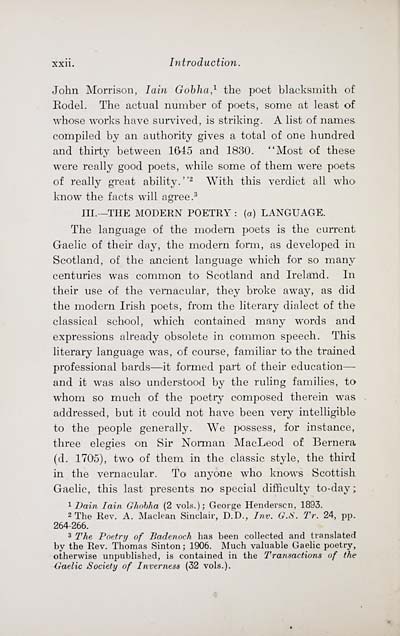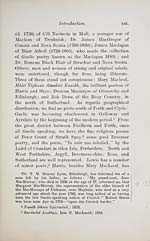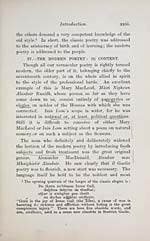Download files
Complete book:
Individual page:
Thumbnail gallery: Grid view | List view

xxii. hitroduction.
John Morrison, laiìi Gobha,^ the poet blacksmith of
Eodel. The aetual number O'f poets, some at least of
whose works have survived, is striking. A list of names
compiled by an authority gives a total of one hundred
and thirty between 1645 and 1830. "Most of these
were really good poets, while some of them were poets
of really great ability."^ With this verdict all who
know the facts wiU agree.^
III.— THE MODERN POETRY : (a) LANGUAGE.
The language of the modem poets is the current
Gaehc of their day, the modern form, as developed in
Scotland, of the ancient language which for so many
centuries was common to Scotland and Ireland. In
their use of the vemacular, they broke away, as did
the modern Irish poets, from the hterary dialect of the
classical school, which contained many words and
expressions already obsolete in conimon speech. This
Hterary language was, of course, famiHar to the trained
professional bards — it formed part of their education —
and it was also understood by the ruUng famiUes, to
whom so much of the poetry composed therein was
addressed, but it could not have been very intelHgible
to the people generally. We possess, for instance,
three elegies on Sir Norman MacLeod of Bernera
(d. 1705), two of them in the classic style, the third
in the vemacular. To anyone who knows Scottish
Gaehc, this last presents no special difficulty to-day;
1 Dain lain Ghobha (2 vols.); George Henderscn, 1893.
2 The Rev. A. Maclean Sinclair, D.D., Tnv. G.S. Tr. 24, pp.
264-266.
3 The Poetrìj of Badenoch has been collected and translated
by the Rev. Thomas Sinton; 1906. Much vahiable Gaelic poetry,
otherwise unpublished, is contained in the Transactions of the
iraelic Society of Inverness (32 vols.).
John Morrison, laiìi Gobha,^ the poet blacksmith of
Eodel. The aetual number O'f poets, some at least of
whose works have survived, is striking. A list of names
compiled by an authority gives a total of one hundred
and thirty between 1645 and 1830. "Most of these
were really good poets, while some of them were poets
of really great ability."^ With this verdict all who
know the facts wiU agree.^
III.— THE MODERN POETRY : (a) LANGUAGE.
The language of the modem poets is the current
Gaehc of their day, the modern form, as developed in
Scotland, of the ancient language which for so many
centuries was common to Scotland and Ireland. In
their use of the vemacular, they broke away, as did
the modern Irish poets, from the hterary dialect of the
classical school, which contained many words and
expressions already obsolete in conimon speech. This
Hterary language was, of course, famiHar to the trained
professional bards — it formed part of their education —
and it was also understood by the ruUng famiUes, to
whom so much of the poetry composed therein was
addressed, but it could not have been very intelHgible
to the people generally. We possess, for instance,
three elegies on Sir Norman MacLeod of Bernera
(d. 1705), two of them in the classic style, the third
in the vemacular. To anyone who knows Scottish
Gaehc, this last presents no special difficulty to-day;
1 Dain lain Ghobha (2 vols.); George Henderscn, 1893.
2 The Rev. A. Maclean Sinclair, D.D., Tnv. G.S. Tr. 24, pp.
264-266.
3 The Poetrìj of Badenoch has been collected and translated
by the Rev. Thomas Sinton; 1906. Much vahiable Gaelic poetry,
otherwise unpublished, is contained in the Transactions of the
iraelic Society of Inverness (32 vols.).
Set display mode to: Large image | Transcription
Images and transcriptions on this page, including medium image downloads, may be used under the Creative Commons Attribution 4.0 International Licence unless otherwise stated. ![]()
| Early Gaelic Book Collections > Matheson Collection > Bardachd Ghaidhlig > (26) |
|---|
| Permanent URL | https://digital.nls.uk/76422847 |
|---|
| Description | Specimens of Gaelic poetry 1550-1900. |
|---|---|
| Shelfmark | Mat.50 |
| Additional NLS resources: | |
| Attribution and copyright: |
|
| Description | Items from a collection of 170 volumes relating to Gaelic matters. Mainly philological works in the Celtic and some non-Celtic languages. Some books extensively annotated by Angus Matheson, the first Professor of Celtic at Glasgow University. |
|---|
| Description | Selected items from five 'Special and Named Printed Collections'. Includes books in Gaelic and other Celtic languages, works about the Gaels, their languages, literature, culture and history. |
|---|

